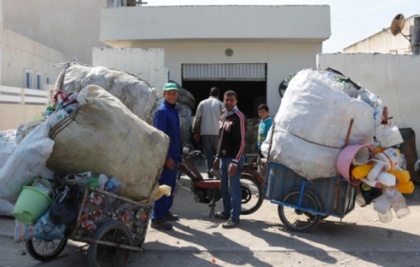Informal Sector

Structural Integration of the Informal Sector in Solid Waste Management
In many developing and emerging economies the informal sector through its activities contributes significantly to the local economic life. Informal sector workers collect valuable resources and, hence, are an important element of the municipal solid waste management system. Recovery and Recycling of scrap material depicts an inevitable part of a sustainable resource management.
Due to their precarious economic situation, the absence of micro-financing systems, missing education and vocational training combined with a limited willingness of municipal administrations to cooperate, the potentials with regard to income generation, employment and inclusion have not yet been explored to its full extend.
As a result the informal sector is left in a legal grey zone often working inefficiently and under malpractice of necessary work safety and health measures. In some cases this may add to further environmental pollution, e.g. during the recovery of valuable materials from electrical and electronic devices. For the development of an integrated solid waste management system it is highly advisable to consider the local circumstances in view of the existing informal sector activities. This may help to gain the required local acceptance of the modification of the system. The structural integration of existing informal sector activities into the local solid waste management system may also contribute to its economic viability.
RETech Conference Informal Sector, November 9 and 10, 2017, in Berlin
Case Study of Tunisia
Municipal solid waste as generated in Tunisia contains an average of up to 24% recyclable materials. Around 8.000 Tunisian waste pickers, so called „Barbéscha“, sustain their economic life through collecting and selling these materials. At the beginning of the pilot project with two Tunisian partner municipalities the barbeschas had been working under precarious conditions with no legal or contractual base. Even though they contributed significantly to the Tunisian recycling sector, they worked without without any access to social security.
The project “Structural Integration of the Informal Sector in Solid Waste Management in Tunisia” has been implemented by GIZ on behalf of the German Federal Ministry of Economic Cooperation and Development between January 2014 and June 2015. The aim of the project was to improve the living and working conditions of the informal sector through its integration into the solid waste management system.
The methodological approach of the project was based on the following assumptions:
- An improved self-organization leads to a strengthening of the negotiation skills and representation of the informal sector.
- Sustainable income perspectives create a financial base for investments.
- The recognition of the informal sector as an integral part of the Tunisian solid waste management system enhances the efficiency of the local solid waste management
The findings and lessons learnt of the project approach have been compiled in cooperation with the Tunisian national Solid Waste Management Agency (ANGed) and published in the following document „National Guidelines for Structural Integration of the Informal Sector in Solid Waste Management“.
An interesting inside into the work and life environment of an informal sector worker may be obtained by watching the short movie Barbesh that has been produced in the frame of the project.
Examples and approaches for a successful integration of the informal sector activities in Middle East and North Africa (MENA), especially in the countries Egypt, Morocco, Palestinian Territories and Tunisia are presented in the document Valuing Informal Integration: Inclusive Recycling in North Africa and Middle East.
Further information
The GIZ sector project “Sustainable waste management and circular economy” published a new study on informal electronic waste recycling in India: "Building the Link: Leveraging Formal-Informal Partnerships in the Indian E-Waste Sector"